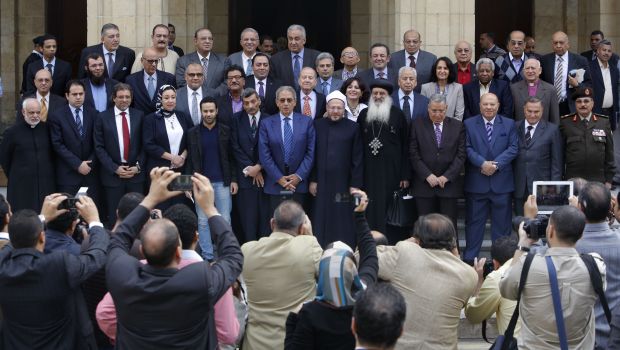
Egypt’s 50-member panel that amended a constitution drafted under now-ousted Islamist President Mohammed Morsi, pose for photographers after finishing the final draft of a series of constitutional amendments outside the Shoura Council in Cairo, Egypt, Monday, Dec. 2, 2013 (AP Photo/Amr Nabil)
Adoption of the new charter will be a giant step in the implementation of the roadmap announced by the nation’s military chief when he toppled Mursi in a July 3 coup. The next steps will be parliamentary and presidential elections in the spring and summer of 2014.
The last constitution was ratified by about 64 percent, but with a low turnout rate of a little more than 30 percent. Approval by a higher percentage and a strong turnout will constitute a vote of confidence in the roadmap.
The panel, appointed by the military-backed interim president Adly Mansour, is dominated by secular-leaning figures. But it includes several Islamists, including one from an ultraconservative party, and representatives from Al-Azhar, Sunni Islam’s foremost seat of learning, and Christian churches. Activists from Tamarod, a youth movement that rallied millions of Egyptians demanding that Mursi step down ahead of the July coup, also sat on the 50-member panel.
The panel held its final deliberations in private but the voting on Saturday and Sunday was televised live.
An upbeat mood prevailed in Monday’s meeting, with members of the panel picked by the military-backed government praising the document as historic and a reflection of Egyptians’ hopes.
“It is now the right of every Egyptian to declare that this is their constitution,” said Anba Paula, the representative of the Coptic Orthodox Church, Egypt’s largest.
Another member, veteran lawyer and head of the Bar Association Sameh Ashour, said: “This constitution may not reflect the expectations of all Egyptians, but it is a safety valve for the revolution at this transitional phase.”
Mursi’s supporters say the constitution’s drafting is illegitimate because of the July 3 coup. Other non-Islamist critics say constitutional guarantees of political rights mean little if state institutions are not committed to upholding them, and worry that a recently enacted law restricting political protests shows the government’s desire to crack down on opponents.
Several members who spoke in Monday’s meeting said a great deal of work lies ahead.
Mahmoud Badr of Tamarod said his grassroots movement will return to the streets to rally support for a “yes” vote on the new charter. Another member, film director Khaled Youssef, said the panel should now work as a body promoting national unity and working to safeguard the alliance of liberal and secular groups that supported Mursi’s ouster.
The draft calls for elections, parliamentary or presidential, within 90 days after the adoption of the constitution. The other election should be held up to six months later. The ambivalence is thought to be designed to give Mansour legal flexibility if he chooses to call for a presidential election ahead of the parliamentary vote.
The roadmap provides for the parliamentary elections to be held first.
The charter requires presidents to declare their financial assets annually, and empowers lawmakers to vote out an elected president with a two-thirds majority. It also bans parties founded on religion or sect and unequivocally states the equality of men and women. It also guarantees the rights of Egyptians with special needs and the elderly.
